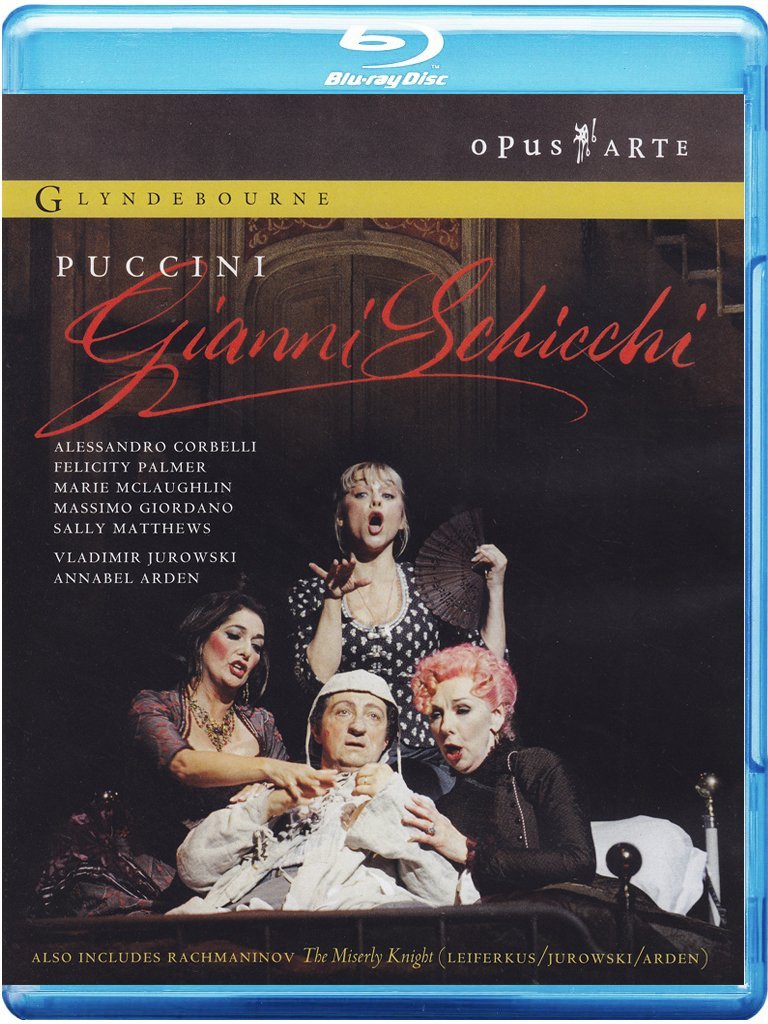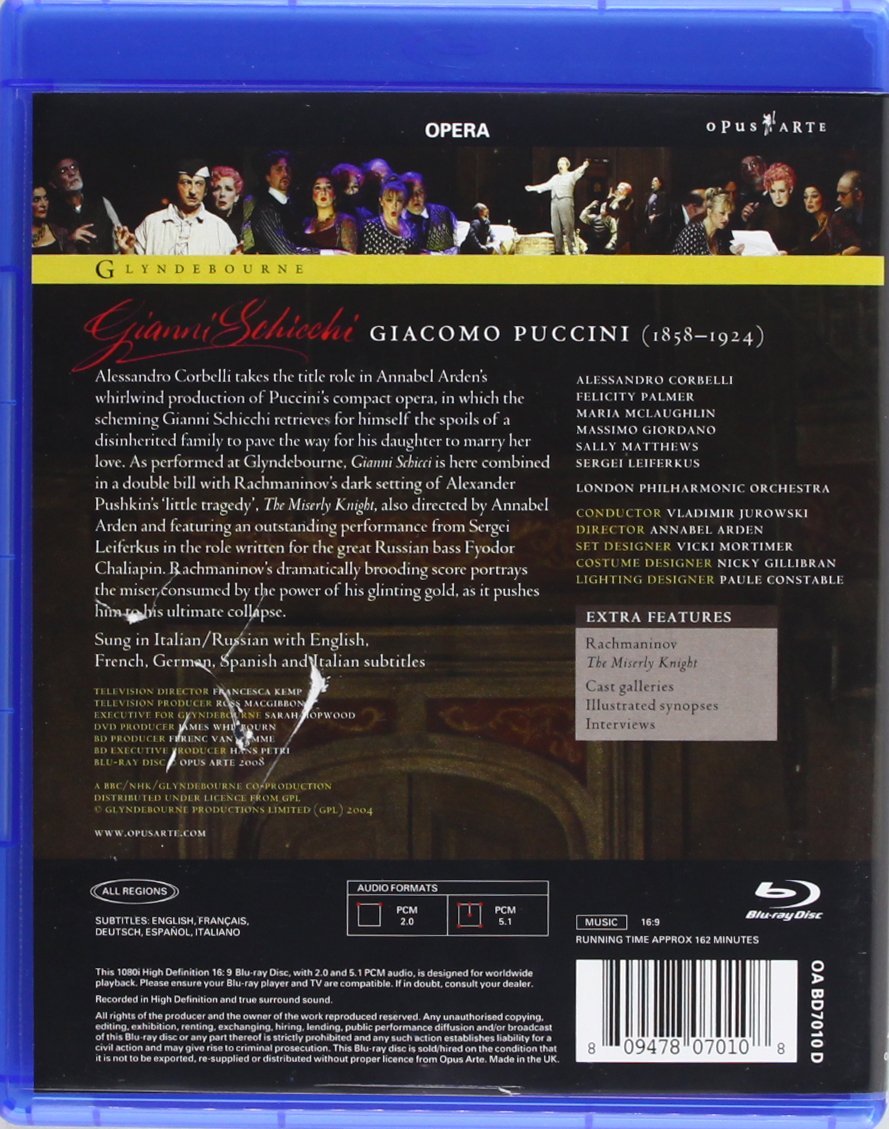

Two short operas directed as a double feature by Annabel Arden at Glyndebourne in 2004.
The disc starts with the Puccini Gianni Schicchi to a libretto by Giovacchino Forzano. Stars Matilda Leyser (Buoso Donati, the deceased, a mute and motionless role), Alessandro Corbelli (Gianni Schicchi, an upstart newcomer to Florence), Sally Matthews (Lauretta, Schicchi's sexy daughter), Massimo Giordano (Rinuccio, Lauretta's boyfriend and member of the Donati family), Felicity Palmer (Zita, head of the Donati family), Marie McLaughlin, Ricardo Novaro, Massimo Giordano, Luigi Roni, Olga Schalaewa, Adrian Thompson, and Maxim Mikhailov (other Donati family members), Viacheslav Voynarovskiy (the Doctor), Richard Mosley-Evans (the Notary), as well as James Gower and Robert Davies (witnesses to the will).
2. Next comes Sergei Rachmaninov's The Miserly Knight to a libretto by the composer. This libretto was taken wholesale with minor changes from a poem by Alexander Pushkin by the same name. Stars Matilda Leyser (mute role), Sergei Leiferkus (The Baron, an old knight, the miser), Richard Berkeley-Steele (Albert, son of the Baron), Maxim Mikhailov (a Servant), Viacheslav Voynarovskiy (Money Lender), and Albert Schagidullin (the Duke).
I list Matilda Leyer first in the casts above because she is the only character to appear in both operas. She is an aerialist. In Gianni Schicchi her only action is to take a bow. In The Miserly Knight, she loots the show.
Vladimir Jurowski conducts the London Philharmonic Orchestra. Set designs by Vicki Mortimer; costumes by Nicky Gillibran; lighting by Paule Constable. Directed for TV by Francesca Kemp. Gianni Schicchi is sung in Italian. The Miserly Knight is sung in Russian. Released 2008, disc has 5.1 PCM sound. Grade: A-
Gianni Schicchi is a slapstick comedy celebrating the antics of one of the earliest confidence artists in literature. It also has one of Puccini's most famous lightening arias. Use this disc to trick your children into liking opera. Here is the opening scene with the Donati family gathered about the bed of the just-deceased, rich uncle Buoso Donati (Matilda Leyser):
The family finds the will, which leaves the estate to some monks:
The most promising member of the family is young Rinuccio. The disappearance of the long-expected inheritance threatens his plans to marry Lauretta, the daughter of Gianni Schicchi. The other members of the Donati family look down on Schicchi as a country bumpkin. But Rinuccio knows how clever Schicchi is:
Rinuccio calls Schicchi to the villa. Freshly insulted by Donati family members, he threatens to leave and break up the proposed marriage of Rinuccio and his daughter. But Lauretta saves the day bursting into "O mio babbino caro" ("Oh dear Daddy") which is featured in the clip at the end of this review:
The only way to wrest back the inheritance is to rewrite the will. Schicchi proves he can mimic old Buoso's voice. So Schicchi will pretend he's the decedent:
Call in the Notary!
The conspirators make a new will with the Notary and his witnesses. The dying Buoso leaves his mule (and much more) to his friend Gianni Schicchi:
At least everybody gets something (except the monks):
Now we move on to Rachmaninov's The Miserly Knight. It's called a bonus on the package, but deserves equal billing. This is one of the few operas where the composer uses the actual text of a masterpiece of world literature for the libretto. (Think of Schubert's courage in daring to write a song to Goethe's beloved Erlkönig ballad.) Alas, to really appreciate The Miserly Knight, you have to learn Russian, not a trivial task.
There are two connections between Gianni Schicchi and The Miserly Knight. The first connection is illuminated by the Mexican proverb "Nadie sabe para quien trabaja." This translates as "nobody knows whom he is working for" and it means that nobody knows who will wind up inheriting his money. The second connection is that the aerialist Matilda Leyer appears in both productions.
The big difference is that Gianni Schicci is a masterpiece of comedy. The Miserly Knight is a tragedy: it's a late-romantic black-hole piece that permits no glimmer of light or melody to escape. It's a psychological autopsy of the sin of greed and its effect on the miserly father, once an feared knight, and his pathetic son, whom we would now describe as "defective personality, passive-dependent type."
The old Baron has for decades lived in abject poverty while hoarding an ever-increasing treasure. First we meet his worthless son, Albert:
Albert considers himself a knight also by heredity. But broke and with no means of earning, all he can hope for is his father's death:
The money lender has withdrawn credit. He suggests poisoning the Baron, but Albert would never have the will to do even that:
Albert will appeal to the Duke, who will require the Baron to give his son an allowance:
Now we meet the Baron:
The Baron is himself a money lender. Each evening he counts his treasure and then adds to it his newly collected interest. His only confidant is the Imp of Greed:
The Baron prays for power to return from the dead to protect his treasure from those unworthy of it:
All the while the Imp of Greed revels:
So who will get the treasure? The answer is something neither father nor son anticipated.
I originally gave this disc an A+ as a brilliant pairing of related but totally different operas. On reconsideration, the works given here seem a bit light-weight compared to many of the other A+ operas we have in HDVD. Technically, every thing about this disc is superlative except the video image (from 2004) is too soft and the picture gets pretty grainy in the dark scenes of The Miserly Knight. So I now give this an A-.
OR





















